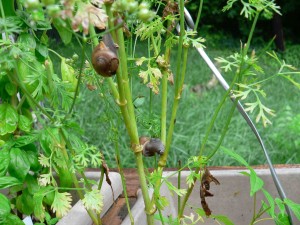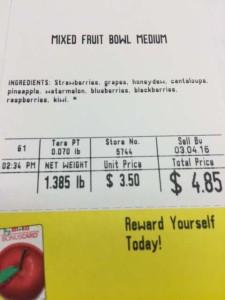Thomas Burke, a Kansas boy pursuing his Masters in Public Health at Emory University, with an emphasis in epidemiology, writes that Cyclospora-laden cilantro from the State of Puebla in Mexico had already sickened large parts of the U.S. in the summers of 2013 and 2014. Unfortunately, the summer of 2015 repeated the same pattern: a large, multi-state outbreak dispersed across the nation.
 The Georgia Food and Feed Rapid Response Team (GaRRT) activated in July 2015 to counter this threat to food safety. In any outbreak investigation, three of the most important pieces of evidence are place, time and the means of exposure to the suspected pathogen (the disease-causing bug). During this investigation, GaRRT members worked together through a combination of surveillance, fact-finding detective work, interstate communications and international collaboration in both public health interventions and policy changes.
The Georgia Food and Feed Rapid Response Team (GaRRT) activated in July 2015 to counter this threat to food safety. In any outbreak investigation, three of the most important pieces of evidence are place, time and the means of exposure to the suspected pathogen (the disease-causing bug). During this investigation, GaRRT members worked together through a combination of surveillance, fact-finding detective work, interstate communications and international collaboration in both public health interventions and policy changes.
Like many detective stories, the Cyclospora outbreak began with a phone call; complaints of gastrointestinal distress reached the Georgia Department of Public Health (DPH). As with any positive Cyclospora case, these complaints were reported due to Cyclospora being a reportable pathogen, or one of “the usual suspects” for severe or rare outbreaks. Cyclospora has the distinction of being the only parasite on Georgia’s list.
Epidemiologists at DPH noted the uptick in Cyclospora cases, which were clusters confined to particular localities across the state. From the epidemiologic evidence, DPH determined the connection — certain restaurants were the common denominator to those found ill with Cyclospora. It became clear at this point that the investigation would span other agencies, because of the many possible leads and evidence involved.
Though DPH is traditionally the lead agency to investigate restaurant outbreaks, the Georgia Department of Agriculture (GDA) routinely works in conjunction by tracing ingredients used in restaurants. Among GDA’s responsibilities are inspecting retail and wholesale food establishments as well as food manufacturers. Since fieldwork members represent both GDA and DPH on the GaRRT, it was easy to bring together the 2 agencies during this investigation, to share the work and combine resources.
Because of the previous 2 outbreaks of Cyclospora, the Centers for Disease Control and Prevention (CDC) asked regulatory agencies across the country to pay particular attention to the origin and distribution of cilantro in the investigation. In 2013 and 2014, cilantro from the State of Puebla, Mexico had been implicated in multi-state outbreaks of Cyclospora, making cilantro the chief suspect in the investigation.
Once the details began to crystalize, the GaRRT officially activated to coordinate federal, state and local entities pertaining to the outbreak. As the epidemiologic evidence from Georgia and Texas (among other states) was assembled, the chase to trace the cilantro started. DPH interviews with restaurant owners and staff directed investigators towards the restaurants’ wholesale suppliers who purchase, store and ship ingredients to restaurants and other food establishments. These interviews led the investigation team down the trucking route to Texas.
Teaming up with officials at the Texas Rapid Response Team, the GaRRT ascertained ports of entry for the cilantro under investigation: Hidalgo and McAllen, Texas. Thanks to this discovery, the team found the cilantro originated from the State of Puebla in Mexico, the same state that produced cilantro contaminated by Cyclospora in the summers of 2013 and 2014.
Because of continuing problems with this region, Mexican and U.S. Food & Drug Administration (FDA) authorities collaborated to address the conditions that allowed for another Cyclospora outbreak. Enhancing fresh cilantro safety was the priority during and after the outbreak. The safety mechanisms incorporated a system for risk reduction — including export controls — for cilantro from the State of Puebla.
Correspondingly, on July 27, 2015, the FDA (a member organization of the GaRRT) implemented a supportive framework of import controls to detain without physical examination shipments of fresh cilantro from Puebla from April through August, 2015. This control framework will continue to be implemented for the same time period in future years.
Shipments of fresh cilantro from other states in Mexico were cleared for importation into the U.S. during this timeframe last summer, but only if documentation demonstrated the cilantro was harvested outside of Puebla. Additionally, the FDA and Mexican public health agencies worked collaboratively to prepare a “Green List” of companies not implicated in the outbreak that are known and documented to be safe in Puebla, whose shipments of fresh cilantro were not detained.
When the outbreak concluded, Cyclospora illnesses attributed to cilantro affected 546 persons in 31 states. Georgia had the third highest case count with 26 documented illnesses. Through the GaRRT, our state also had the distinction of identifying clusters and investigating leads that ultimately helped solve questions presented by the outbreak.









